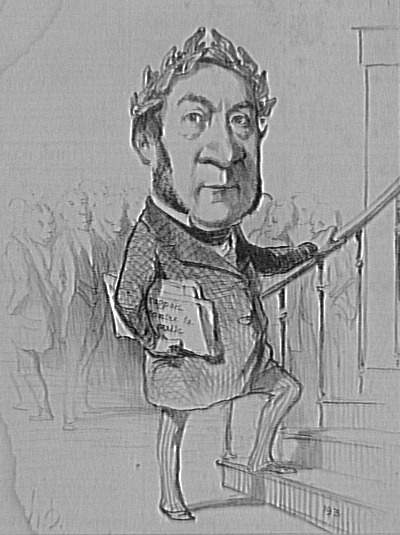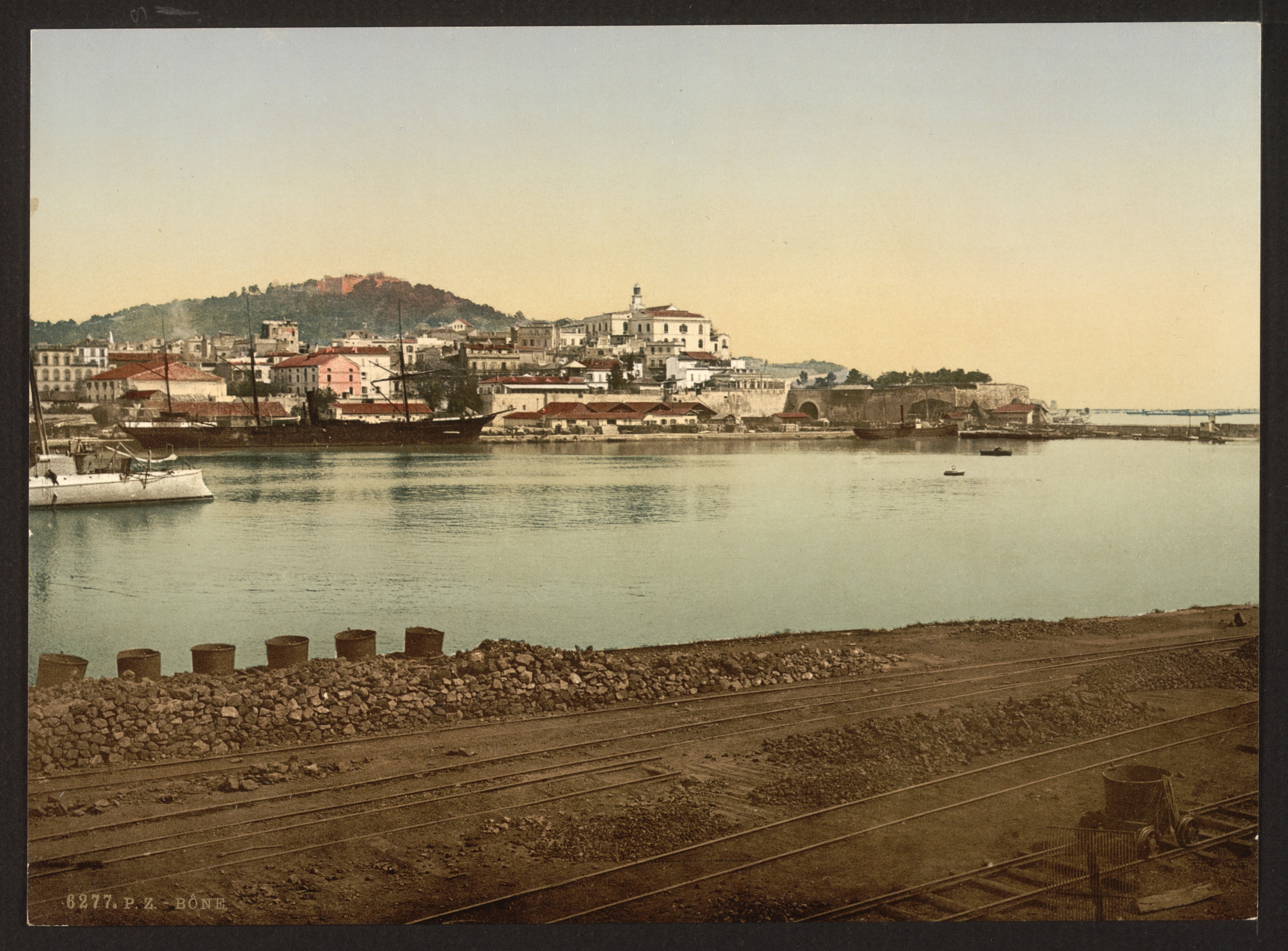|
Prosper De Chasseloup-Laubat
Justin Napoléon Samuel Prosper de Chasseloup-Laubat, 4th Marquis of Chasseloup-Laubat (29 May 1805, Alessandria, Department of Marengo, French Empire – 29 March 1873, Paris, France) was a French aristocrat and politician who became Minister of the Navy under Napoleon III and was an early advocate of French colonialism. Early life and family Chasseloup-Laubat was the descendant of a minor noble family from Saintonge whose members were Huguenot but converted to Catholicism in the 17th century. He was the youngest son of the General François de Chasseloup-Laubat, 1st Marquis of Chasseloup-Laubat (1754-1833), and of his wife Anne-Julie Fresneau de La Gataudière, granddaughter of François Fresneau de La Gataudière who had discovered the properties of rubber. His godparents were Emperor Napoleon I and his first wife Empress Josephine. His brother, Justin (1800-1847), 2nd Marquis of Chasseloup-Laubat, was a military and politician and died as he was serving as French amb ... [...More Info...] [...Related Items...] OR: [Wikipedia] [Google] [Baidu] |
Ministère De La Marine
The Ministry of the Navy (french: Ministère de la Marine) was a section of the French government – apart from the Ministry of War – that was in charge of the French navy and colonies. The ministry combined the administration of the navy, the colonies like New France and seaborne trade helping for example the French East India Company. A widely held view at the time was that for states to be powerful, wealthy and prestigious, colonies in the New World need to be maintained for their consequent trade. The maintenance of colonies through naval operations not only served to improve the stature of the state, but was also helpful in destroying their European rivals in North America. After the Second World War, the Ministry of the Navy was merged with the War Ministry, absorbing the role of the Minister of the Navy and Colonies, with a Minister of National Defence directing the entire military French forces. Creation and history Since the 16th century, the Secretary of State of ... [...More Info...] [...Related Items...] OR: [Wikipedia] [Google] [Baidu] |
Napoleon
Napoleon Bonaparte ; it, Napoleone Bonaparte, ; co, Napulione Buonaparte. (born Napoleone Buonaparte; 15 August 1769 – 5 May 1821), later known by his regnal name Napoleon I, was a French military commander and political leader who rose to prominence during the French Revolution and led successful campaigns during the Revolutionary Wars. He was the ''de facto'' leader of the French Republic as First Consul from 1799 to 1804, then Emperor of the French from 1804 until 1814 and again in 1815. Napoleon's political and cultural legacy endures to this day, as a highly celebrated and controversial leader. He initiated many liberal reforms that have persisted in society, and is considered one of the greatest military commanders in history. His wars and campaigns are studied by militaries all over the world. Between three and six million civilians and soldiers perished in what became known as the Napoleonic Wars. Napoleon was born on the island of Corsica, not long ... [...More Info...] [...Related Items...] OR: [Wikipedia] [Google] [Baidu] |
Constantine, Algeria
Constantine ( ar, قسنطينة '), also spelled Qacentina or Kasantina, is the capital of Constantine Province in northeastern Algeria. During Roman times it was called Cirta and was renamed "Constantina" in honor of emperor Constantine the Great. It was the capital of the French department of Constantine until 1962. Located somewhat inland, Constantine is about from the Mediterranean coast, on the banks of the Rhumel River. Constantine is regarded as the capital of eastern Algeria and the commercial center of its region, and it has a population of about 450,000 (938,475Office National des Statistiques, Recensement General de la Population et de l’Habitat 2008 2008 population census. Accessed on 2016-01-27. with the agglomeration), making it the ... [...More Info...] [...Related Items...] OR: [Wikipedia] [Google] [Baidu] |
Annaba
Annaba ( ar, عنّابة, "Place of the Jujubes"; ber, Aânavaen), formerly known as Bon, Bona and Bône, is a seaport city in the northeastern corner of Algeria, close to the border with Tunisia. Annaba is near the small Seybouse River and is in the Annaba Province. With a population of about 464,740 (2019) and 1,000,000 for the metropole, Annaba is the third-largest city and the leading industrial center in Algeria. Annaba is a coastal city that underwent significant growth during the 20th century. Annaba has a metropolitan area with a higher population density than the other metropolitan areas of the Algerian coastline, such as Oran and Algiers. Much of eastern and southern Algeria uses the services, equipment and infrastructure of Annaba. Economically, it is the centre for various economic activities, such as industry, transportation, finance, and tourism. Names Present-day Annaba grew up on the site of Aphrodisium, the seaport of the Roman city . (The modern cit ... [...More Info...] [...Related Items...] OR: [Wikipedia] [Google] [Baidu] |
Tunis
''Tounsi'' french: Tunisois , population_note = , population_urban = , population_metro = 2658816 , population_density_km2 = , timezone1 = CET , utc_offset1 = +01:00 , timezone1_DST = , utc_offset1_DST = , postal_code_type = Postal code , postal_code = 1xxx, 2xxx , area_code_type = Calling code , area_code = 71 , iso_code = TN-11, TN-12, TN-13 and TN-14 , blank_name_sec2 = geoTLD , blank_info_sec2 = .tn , website = , footnotes = Tunis ( ar, تونس ') is the capital and largest city of Tunisia. The greater metropolitan area of Tunis, often referred to as "Grand Tunis", has about 2,700,000 inhabitants. , it is the third-largest city in the Maghreb ... [...More Info...] [...Related Items...] OR: [Wikipedia] [Google] [Baidu] |
Algiers
Algiers ( ; ar, الجزائر, al-Jazāʾir; ber, Dzayer, script=Latn; french: Alger, ) is the capital and largest city of Algeria. The city's population at the 2008 Census was 2,988,145Census 14 April 2008: Office National des Statistiques de l'Algérie (web). and in 2020 was estimated to be around 4,500,000. Algiers is located on the Mediterranean Sea and in the north-central portion of Algeria. Algiers is situated on the west side of a bay of the Mediterranean Sea. The modern part of the city is built on the level ground by the seashore; the old part, the ancient city of the deys, climbs the steep hill behind the modern town and is crowned by the Casbah or citadel (a UNESCO World Heritage Site), above the sea. The casbah and the two quays form a triangle. Names The city's name is derived via French and Catalan ''Origins of Algiers'' by Louis Leschi, speech delivered June 16, 1941, published in ''El Djezair Sheets'', July 194History of Algeria . from the Arabic name ... [...More Info...] [...Related Items...] OR: [Wikipedia] [Google] [Baidu] |
French Algeria
French Algeria (french: Alger to 1839, then afterwards; unofficially , ar, الجزائر المستعمرة), also known as Colonial Algeria, was the period of French colonisation of Algeria. French rule in the region began in 1830 with the invasion of Algiers and lasted until the end of the Algerian War of Independence in 1962. While the administration of Algeria changed significantly over the 132 years of French rule, the Mediterranean coastal region of Algeria, housing the vast majority of its population, was an integral part of France from 1848 until its independence. As one of France's longest-held overseas territories, Algeria became a destination for hundreds of thousands of European immigrants known as ''colons'', and later as . However, the indigenous Muslim population remained the majority of the territory's population throughout its history. Many estimates indicates that the native Algerian population fell by one-third in the years between the French invasion a ... [...More Info...] [...Related Items...] OR: [Wikipedia] [Google] [Baidu] |
Jean-Jacques Baude
Jean-Jacques Baude (19 February 1792 - 6 February 1862) was a French administrator and politician. He was a deputy from 1830 to 1839, and again from 1842 to 1846. Early years Baron Jean-Jacques Baude was born in Valence, Drôme on 19 February 1792, where his father was Attorney General. He started work in his father's office in the prefecture of Tarn. Towards the end of the reign of Napoleon he joined the administration. He was appointed in turn sub-prefect of Confolens on 8 April 1813, sub-prefect of Roanne on 2 November 1814 and sub-prefect of Saint-Étienne on 4 June 1815. Baude recognized Louis XVIII of France in the first restoration, but on the return of Napoleon placed himself at the head of the guards who opposed the advance of the Duke of Angoulême on Lyon. After the battle of Waterloo he resigned and published ''Le Lundi gras et le mercredi des Cendres'' (Fat Monday and Ash Wednesday), which was condemned by the royal court of Grenoble. He then became involved in fin ... [...More Info...] [...Related Items...] OR: [Wikipedia] [Google] [Baidu] |
Gilbert Du Motier, Marquis De Lafayette
Marie-Joseph Paul Yves Roch Gilbert du Motier, Marquis de La Fayette (6 September 1757 – 20 May 1834), known in the United States as Lafayette (, ), was a French aristocrat, freemason and military officer who fought in the American Revolutionary War, commanding American troops in several battles, including the siege of Yorktown. After returning to France, he was a key figure in the French Revolution of 1789 and the July Revolution of 1830. He has been considered a national hero in both countries. Lafayette was born into a wealthy land-owning family in Chavaniac in the province of Auvergne in south central France. He followed the family's martial tradition and was commissioned an officer at age 13. He became convinced that the American revolutionary cause was noble, and he traveled to the New World seeking glory in it. He was made a major general at age 19, but he was initially not given American troops to command. He was wounded during the Battle of Brandywine but still m ... [...More Info...] [...Related Items...] OR: [Wikipedia] [Google] [Baidu] |
National Guard (France)
The National Guard (french: link=no, Garde nationale) is a French military, gendarmerie, and police reserve force, active in its current form since 2016 but originally founded in 1789 during the French Revolution. For most of its history the National Guard, particularly its officers, has been widely viewed as loyal to middle-class interests. It was founded as separate from the French Army and existed both for policing and as a military reserve. However, in its original stages from 1792 to 1795, the National Guard was perceived as revolutionary and the lower ranks were identified with sans-culottes. It experienced a period of official dissolution from 1827 to 1830 but was reestablished. Soon after the Franco-Prussian War of 1870–71, the National Guard in Paris again became viewed as dangerously revolutionary, which contributed to its dissolution in 1871. In 2016, France announced the reestablishment of the National Guard for the second time, in response to a series of te ... [...More Info...] [...Related Items...] OR: [Wikipedia] [Google] [Baidu] |
Conseil D'État (France)
In France, the Council of State (french: Conseil d'État, links=no, ) is a governmental body that acts both as legal adviser to the executive branch and as the supreme court for administrative justice. Established in 1799 by Napoleon as a successor to the King's Council (''Conseil du Roi''), it is located in the Palais-Royal in Paris and is primarily made up of top-level legal officers. The Vice President of the Council of State ranks as the ninth most important civil servant in France. Members of the Council of State are part of a Grand Corps of the French State (''Grand corps de l'État''). The Council of State mainly recruits from among the top-ranking students graduating from the École nationale d'administration. Composition A General Session of the Council of State is presided over by the Prime Minister or, in their absence, the Minister of Justice. However, since the real presidency of the Council is held by the Vice-President, the Vice President of the Council of St ... [...More Info...] [...Related Items...] OR: [Wikipedia] [Google] [Baidu] |







